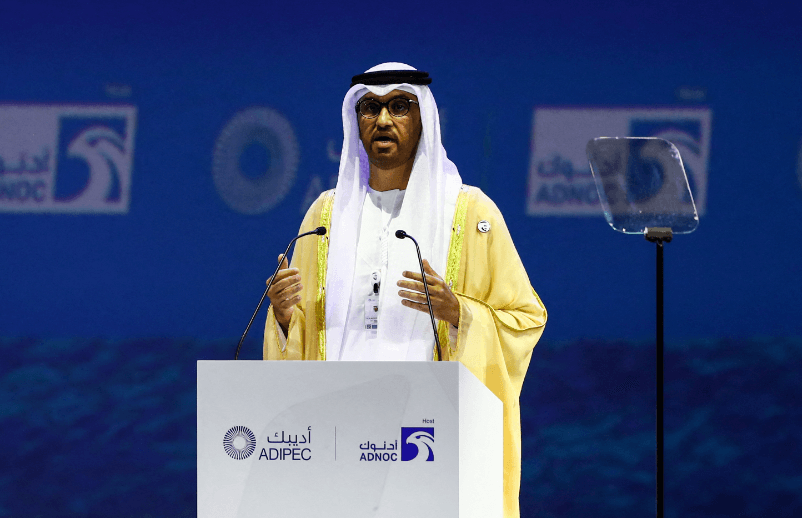- Highly autonomous artificial intelligence
- ‘It will perceive, think, learn and act’
- But AI ‘creating massive power surge’
Highly autonomous artificial intelligence, known as agentic AI, is being used for the first time by Abu Dhabi’s state oil company Adnoc in the hope of massively increasing the accuracy of production forecasts.
Adnoc’s CEO Sultan Al Jaber said in a speech on the first day of the Adipec energy conference in Abu Dhabi that it was working with Microsoft and the UAE’s AI development companies G42 and AIQ on agentic AI, considered the next frontier in artificial intelligence.
The system, called EnergyAI, uses specialised AI “agents” trained on specific tasks across Adnoc’s value chain, ranging from seismic data analysis to real-time process monitoring and energy efficiency management.
Rather than reacting to prompts and queries by humans, it can make independent decisions based on pre-set goals.
EnergyAI will increase the accuracy of production forecasts by up to 90 percent, said Al Jaber, who is also the UAE’s minister of industry and advanced technology.
It “will not only analyse gigabytes of data, it will also proactively and autonomously identify operational improvements and perceive, think, learn and act,” Al Jaber told delegates.
Suhail Al Mazrouei, the UAE’s minister of energy and infrastructure, said on Monday that the Gulf state intended to play “a key role” in AI in the Middle East and worldwide.
“You will see more projects,” he said, without giving details.
Although private investments in AI reached $250 billion between 2017 and 2023, only 5 percent went to the energy sector, according to a report which Adnoc, Masdar and Microsoft co-authored ahead of Adipec.
Adnoc said in March that it generated $500 million (AED1.84 billion) in extra value by using artificial intelligence solutions in 2023.
“It will be a powerhouse for value creation, efficiency and sustainable energy production that can benefit the whole industry,” Al Jaber said.
It will allow the delivery of “maximum energy with minimal emissions to the people and communities”.
Power surge
Al Jaber said AI was redefining the boundaries of productivity and efficiency and had the potential to accelerate the transformation of energy systems and to supercharge low-carbon growth.
However, he said it was also “creating a power surge that no one anticipated 18 months ago”. The energy requirement to power AI-ready data centres will bring AI use to 0.24 percent of global electricity demand by 2026.
“Over the next six years, data centres will more than double, requiring at least 150GW of installed capacity by 2030 and double that again by 2040,” Al Jaber said.
Meeting this demand sustainably will require harnessing diverse energy sources, from renewables and nuclear to LNG, alongside advanced infrastructure and increased investment.
Oil will continue to be used for fuel, while wind and solar will expand seven times, and LNG will grow by at least 65 percent, he said.
Al Jaber said that energy markets must shift and grow and energy systems must be transformed, as, by 2050, 1.7 billion people will join the planet, mainly in the global south, while demand for electricity will double.
“A future of humanity depends on the future of energy,” and providing sustainable energy security is more essential than ever “in a time of complexity and conflict”, he said.
